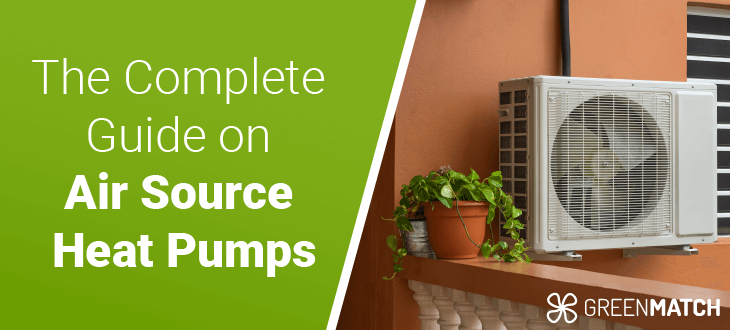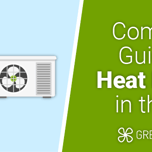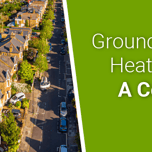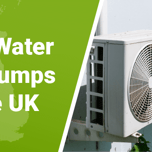Answer these simple questions and we will find you the BEST prices
Which type of solar quotes do you need?
It only takes 30 seconds
100% free with no obligation

Get up to 4 quotes by filling in only 1 quick form

Install a heat pump for less with the BUS grant

We’ve helped over 500,000 homeowners reduce their carbon footprint
- GreenMatch
- Air Source Heat Pumps
Air Source Heat Pump Guide in The UK (2025)


- Air source heat pumps use outside air to heat your home, with air to water models also providing hot water. Air to air heat pumps can also reverse the process to provide cooling.
- An air source heat pump is an efficient system that helps lower your carbon footprint and save on heating bills.
- On average, installing an air source heat pump costs between £4,000 and £15,000.
- With the most recent update of the Boiler Upgrade Scheme, you can receive up to £7,500 for an air source heat pump installation.
Installing an air source heat pump is a great way to lower your home’s environmental impact and reduce your energy bills by up to £290 per year. But how does a heat pump work?
In this article, we’ll explain heat pump operation and guide you through their advantages, disadvantages, efficiency rates, and costs.
What is an air source heat pump?
An air source heat pump is a renewable energy system that provides warmth by extracting heat from the air outside and transferring it into your home. When considering the benefits of a heat pump vs a gas boiler, it's 3 times more efficient and produces 2–3 times fewer CO2 emissions yearly. As a result, it can help you reduce your carbon footprint, as well as your yearly energy bills.
Air source heat pumps work by compressing the warm air they absorb and transporting it inside your home through a heat exchanger. Air to air heat pumps, including split heat pumps, can also reverse the process to provide cooling, but this feature is not available in air to water heat pumps.
You can consult the diagram below for a clearer idea of how air source heat pumps work to warm up your house. For air to air heat pumps, warm air is distributed directly, while air to water heat pumps transfer heat to water for radiators or underfloor heating systems:
What types of air source heat pumps are there?
There are 2 types of air source heat pumps: air to air heat pumps and air to water heat pumps. Air to air heat pumps transfer hot or cool air into your home using a fan system. In contrast, air to water heat pumps heat water, which is then used for radiators, underfloor heating systems, and taps.
| Heat Pump Type | Average Efficiency | Output Size Range | Estimated Cost | Estimated Annual Savings |
|---|---|---|---|---|
| Air to air | 250% | 7.5 - 11.5kW | £4,000 - £9,500 | Up to £166 |
| Air to water | 300% | 4 - 16kW | £9,000 - £15,000 | Up to £290 |
| Ground source | 400% | 3 - 16kW | £11,500 - £27,500 | Up to £2,000 |
There are also heat pump water heaters and hybrid heat pumps, each serving different purposes.
Heat pump water heaters efficiently heat water by using heat from the air, making them a greener alternative to traditional water heaters. Hybrid heat pumps combine an air-to-air system with a gas boiler, providing both air heating and hot water, even in colder weather.
Are air source heat pumps worth it?
When asked the question, "Are air source heat pumps worth it?" the answer will be yes.
The primary advantage is their ability to significantly reduce your carbon footprint by up to 1,900kg of CO2 per year, compared to gas boilers, which emit around 2,200kg of CO2 annually. To put it into perspective, a gas boiler produces more annual CO2 than 7 transatlantic flights.
In addition to this significant environmental advantage, air source heat pumps reduce your yearly energy bills. By replacing an old gas boiler with an air source heat pump, you can save up to £290 annually.
The costs
Air source heat pump costs range from £4,000 to £15,000. You will pay less if you install an air to air heat pump, which costs around £4,000—£9,500, whereas an air to water heat pump is more expensive (about £9,000—£15,000).
Other factors that affect the cost of an air source heat pump include the heat pump brand you opt for, the power output size you require, and the installer you choose to work with.
Take a look at the table below to get an idea of how much you might spend in terms of supply and installation costs for an air to air or air to water heat pump:
| Heat Pump Type | Estimated Supply Cost | Estimated Installation Cost | Estimated Total Cost |
|---|---|---|---|
| Air to air | £3,850 - £9,200 | £150 - £300 | £4,000 - £9,500 |
| Air to water | £8,650 - £13,300 | £350 - £1,700 | £9,000 - £15,000 |
Grants
Currently, there are multiple heat pump grants available in the UK. These are: The Boiler Upgrade Scheme, The Energy Company Obligation (ECO4), Warmer Homes Scotland Scheme, Home Energy Scotland Scheme, and Warm Homes Programme Wales. At the same time, you can benefit from a VAT reduction when installing a heat pump.
Here’s what you can save by applying for one of these schemes:
| Grant | Savings | Main Eligibility Criteria |
|---|---|---|
| Boiler Upgrade Scheme | Up to £7,500 | You must own the property you live in and replace a fossil fuel energy system with a renewable one. |
| Energy Company Obligation (ECO4) | Up to £7,000 | You must own the property you live in and receive certain benefits. |
| Warmer Homes Scotland Scheme | Up to £10,000 | You own the property you live in and have an inefficient heating system (E, F, or G-rated). |
| Home Energy Scotland Scheme | Up to £9,000 | You own the property you live in and have an inefficient heating system (E, F, or G-rated). |
| Warm Homes Programme Wales | Potential full coverage of heat pump installation costs | You must receive certain benefits and have a low-income household. |
| 0% VAT | Up to £2,450 | You must combine the purchase of your heat pump with the installation. |
Before applying for a grant, check if you meet the eligibility criteria. These usually depend on your location, income, and housing situation.
Most asked practical questions about air source heat pumps
Yes, you can connect your air source heat pump, specifically an air to water heat pump, to your existing radiators. You’ll just have to make sure that they are the right size to adequately support the energy supply of your air source heat pump.
Air source heat pump power output ranges from 4 to 16kW, making them suitable for small and large households. If you’re wondering about air source heat pump dimensions, they are around 100–150 centimetres high and 50—100 centimetres wide, so they don’t take up too much space.
Yes, air source heat pumps work well in the UK’s climate! They are designed to operate efficiently even at temperatures as low as -10°C. However, since the UK has a moderate climate that rarely reaches such cold temperatures, you can rest assured that the weather will not significantly deter the operation of your air source heat pump.
That depends on the kind of heat pump you get. With an air to air heat pump, you can attend to your heating needs but not your hot water supply. Alternatively, you could opt for a hybrid heat pump and combine an air to air heat pump with a gas boiler for your heating and hot water needs.
With an air to water heat pump, however, you reduce your reliance on a boiler and the grid, as it can provide heating, cooling, and hot water.
Want to know more about air source heat pumps? Not to worry — one of our experts can help you. By filling in our 30-second form, we’ll connect you with up to 4 local installers who can help you with your questions and heat pump installation.
Simply click below to get started today — it’s quick, easy, and completely free!
- Quotes from local engineers
- Payment by finance available
- Save £7,500 with BUS grant
It only takes 30 seconds



Air source heat pump benefits
Air source heat pumps (ASHPs) represent a sustainable and cost-effective solution for year-round comfort. Extracting ambient air heat, even in cold weather, ASHPs deliver 3–4 times the efficiency of gas boilers, significantly reducing energy costs.
Furthermore, ASHPs are more affordable than ground source heat pumps. The cost of a ground source heat pump is often higher due to complex installation requirements. Both systems are eligible for government-backed incentives like the Boiler Upgrade Scheme, but ASHPs generally offer a lower upfront cost.
The primary benefits of an air source heat pump include:
- Environmental friendliness: ASHPs have lower carbon emissions than conventional heating and cooling systems such as gas boilers and air conditioners.
- Versatility: They are suitable for various applications, such as heating, cooling, and supplying hot water in the case of air to water heat pumps.
- Cost-effectiveness: Compared to ground source heat pumps, they are more affordable and easier to install, cutting labour costs.
- Energy efficiency: ASHPs are 3–4 times more efficient than traditional energy systems, such as gas boilers.
- Financial incentives: They are eligible for grants like the Boiler Upgrade Scheme, which offers up to £7,500 towards installing an ASHP. These are regionally dependent across the UK, so air source heat pumps in Wales will receive different incentives than in England or those choosing air source heat pumps in Scotland, for example.
Air source heat pump grants in Northern Ireland differ slightly from those in the rest of the UK. For this reason, we highly recommend checking our article on air source heat pumps in Northern Ireland.
What are the advantages & disadvantages of an air source heat pump?
Before investing in one, it’s crucial to carefully weigh the pros and cons of air source heat pumps. Below, you can find the primary advantages and disadvantages of this kind of energy system:
– Lower carbon footprint
– Cost-effective
– Versatile
– Highly efficient
– Lower heat output
– Needing adequate insulation
– Lower efficiency in cold weather
– Reduced savings with cheap mains gas
– Noisy operation
Air source heat pump advantages
- Lower carbon footprint: ASHPs are a form of renewable energy that produces fewer carbon emissions than conventional energy systems. While gas boilers produce 2,500kg of CO2 per year, ASHPs produce 850kg.
- Save money on energy bills: By switching to an ASHP, you can reduce your annual energy bills by as much as £1,200, depending on the kind of energy system you’re replacing with it.
- Versatile: ASHPs can provide heating, cooling, and hot water (if you install an air to water heat pump). This means that a heat pump can do the work of both a boiler and an air conditioner.
- Highly efficient: ASHPs boast efficiency rates of up to 400%. This is measured through the Coefficient of Performance (CoP), which ranges from 2 to 4 for ASHPs.
- Easy installation process: ASHP installation is quite straightforward, particularly for monobloc heat pumps. It can be completed in about 2 days without causing huge disruptions to your home's comfort.
- Low maintenance: Once installed, ASHPs only require occasional checks to ensure that they are still operating properly. Usually, this can be done once every 2–3 years.
- Long lifespan: ASHPs have a lifespan of about 10–15 years. With proper care and maintenance, they can run properly for the duration of their lifespan.
- Increased safety: ASHPs run on electricity, eliminating the need for fuel types with high combustion rates, such as gas. As a result, the risk of accidents with your heating system is significantly reduced.
Air source heat pump disadvantages
- Lower heat output: ASHPs produce less heat than gas boilers, requiring larger radiators for the same space heating.
- Adequate insulation needed: ASHPs need a well-insulated home to work effectively. Because they produce less heat than other systems, inadequate insulation will lead to the rapid loss of that warmth.
- Lower efficiency in cold weather: If you're wondering, "Do heat pumps work in cold weather?" You'll be glad to know that the answer is yes. However, ASHPs lose some of their efficiency below 0°C due to the cold outside air. Fortunately, with an air source heat pump in the UK, you may not notice these effects due to the mild climate.
- Lower savings with cheap mains gas: ASHPs may not offer significant savings if mains gas is cheap. That said, with the UK shifting towards renewable energy to meet its zero carbon targets, incentives may start to increase.
- Noisy operation: If you're wondering, "Are heat pumps noisy?" You should know that some ASHP models can produce noise levels ranging from 40 to 60 decibels—comparable to the sound of a quiet conversation or light to heavy rain. However, most modern heat pumps are designed to operate quietly.
What types of air source heat pumps are there?
There are two types of air source heat pumps. The main distinction between the two lies in how they distribute their heat: through air or water. There are also hybrid heat pumps, which combine a heat pump and a gas boiler for consistent heating and hot water supply.
Air to air heat pumps
Air to air heat pumps absorb heat from the air outside and transfer it directly into your home usually via a ventilation fan system.
These heat pumps use significantly less energy than conventional heating systems and can conveniently switch from heating to cooling. They are sustainable, efficient, and affordable, with costs ranging from £4,000–£9,500 for a full installation.
Air to water heat pumps
While air to air pumps excel at cooling and cost-effectiveness, air to water heat pumps provide a more comprehensive heating solution. They take heat from the outside air to warm up water, which is then transferred to radiators, underfloor heating, and taps.
On average, an air to water heat pump costs between £9,000–£15,000, including installation. Even though it’s more expensive than air to air heat pumps, it’s worth noting that these systems are a more complex energy system. So much so, that the heat it produces can be used for both central heating and domestic hot water if combined with a hot water storage tank.
Hybrid air source heat pumps
Hybrid heat pumps are ideal if your household has high heating demands. They combine a gas boiler with an air source heat pump to ensure that you can enjoy consistent heating and hot water, as well as cooling. In terms of cost, hybrid heat pumps are the most expensive option, as you need to account for both a heat pump and a boiler. As an estimate, they can cost anywhere from £10,250 to £18,550.
Interested in one of these heat pumps but no clue how to proceed with the installation process? We’re here to help. We work with a broad network of reputable specialists and can put you in touch with 4 of them in no time.
All you need to do is fill in our 30-second form, and they’ll get back to you with free, no-obligation quotes. Click below to start looking for the right installer today!
- Quotes from local engineers
- Payment by finance available
- Save £7,500 with BUS grant
It only takes 30 seconds



Air source heat pump efficiency
Heat pump efficiency is measured by the Coefficient of Performance (CoP), which can range from 2 to 4.5. Air source heat pumps generally have a CoP of up to 4.
Efficient air source heat pump performance can also be indicated in percentages. Below you can find an overview of the efficiency rates of different types of heat pumps:
| Heat Pump Type | Efficiency (%) |
|---|---|
| Air to air heat pump | 300% |
| Air to water heat pump | 200% - 400% |
What is the cost of air source heat pumps?
An air source heat pump installation can cost anywhere between £4,000–£15,000. Air source heat pump cost depends on the type: air to air heat pumps typically cost between £4,000 and £9,500, and air to water heat pumps are more expensive, ranging from £9,000 to £15,000.
| ASHP System Type | Estimated Cost (Including Installation) | Estimated Yearly Savings |
|---|---|---|
| Air to air heat pump | £4,000–£9,500 | Up to £290 |
| Air to water heat pump | £9,000–£15,000 | Up to £290 |
When it comes to the running costs of ASHPs, these will vary depending on the size of your home, the air source heat pump size, your energy demands, and how well your house is insulated. For an overview of the estimated annual running costs of this energy system, you can consult the table below:
| Heat Pump Type | 1 Bedroom | 2-3 Bedrooms | 4+ Bedrooms |
|---|---|---|---|
| Air to air | £1,185 | £1,710 | £2,435 |
| Air to water | £855 | £1,205 | £1,700 |
As you can see, purchasing an air source heat pump is a significant investment. Fortunately, there are some heat pump grants available in the UK.
One of the main ones is the Boiler Upgrade Scheme, which offers up to £7,500 to eligible homeowners looking to install a heat pump.
Is an air source heat pump something for your household?
An air source heat pump can be a great addition to your home if you’re looking to reduce your carbon emissions and your yearly energy bills.
Compared to gas boilers, an ASHP allows you to reduce your carbon emissions by 1,650kg per year. That’s equivalent to driving 6,800km with a car running on gasoline. Additionally, once you install such an energy system instead of an old gas boiler, you can expect savings of up to £290 per year per year on your energy bills.
While these benefits can seem attractive, the high installation costs of an ASHP, ranging from £4,000 to £15,000, can be quite off-putting. Fortunately, grants such as the Boiler Upgrade Scheme can lessen the blow to your bank account. By applying, you can receive up to £7,500 to install an ASHP.
To ensure that you’re not overspending on your air source heat pump installation, you will need to compare the labour costs of several different installers. Yet, doing this on your own can take hours or even days of gruelling research. Fortunately, we’ve done the hard work for you and can connect you with up to 4 local installers in no time.
Just fill in our 30-second form and we’ll have the installers reach out to you with free, non-binding quotes.
Click below to start!
- Quotes from local engineers
- Payment by finance available
- Save £7,500 with BUS grant
It only takes 30 seconds



Frequently asked questions
Yes, air source heat pumps are worth it. They reduce your home’s carbon emissions by 1,650kg in comparison to gas boilers, and they offer savings of up to £290 on your annual energy bills. These are just a few of the many advantages they bring.
Yes, air source heat pumps can save you up to £1,200 compared to traditional heating systems. Exactly how much you can save with an air source heat pump depends on its efficiency levels and your energy consumption habits.
The running costs of air source heat pumps can range from £760 – £1,700 a year and they largely depend on the system size and current gas prices. Your running costs will also vary based on the type of air source heat pump you have.
You can expect to pay anywhere between £4,000–£15,000 for an air source heat pump, including installation costs. However, exactly how much you’ll spend depends on whether you’re installing an air to air heat pump, which tends to be cheaper, or an air to water heat pump, which is more expensive.
Air source heat pumps can still provide heating during the winter months in the UK. However, one of the disadvantages of air source heat pumps is that their efficiency may decrease in temperatures below 0°C, as they rely on heat from the outside air to warm up your home.

Valli has been writing well researched articles about renewable energy, sustainability and green technologies for GreenMatch since 2017. Her work has been published in various media such as Entrepreneur, Business Insider, Canadian Geographic, uSwitch, and eCycle.

We strive to connect our customers with the right product and supplier. Would you like to be part of GreenMatch?

- Air Source Heat Pump Guide in The UK (2025)
- Air source heat pump benefits
- What are the advantages & disadvantages of an air source heat pump?
- What types of air source heat pumps are there?
- Air source heat pump efficiency
- What is the cost of air source heat pumps?
- Is an air source heat pump something for your household?
- Frequently asked questions





